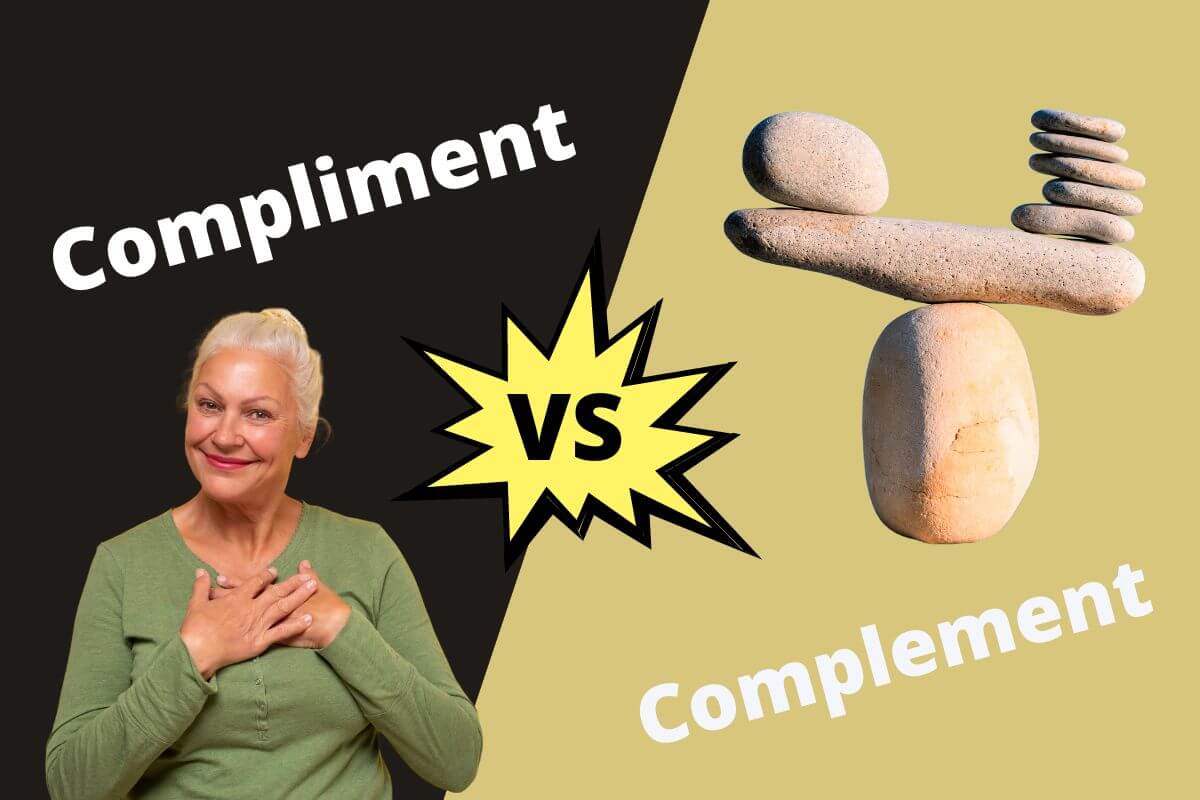Compliment means to praise, admire, or commend. We often use it to express our regard or admiration for someone. Complement, on the other hand, means completing or enhancing. The word complement is used to mean to compliment.
Homophones are words that sound the same but have different meanings. Compliment and complement are considered homophones because they sound nearly the same but have different meanings.
Table of Contents
Compliment vs Complement
| Compliment | Parameters | Complement |
| a sense of praise and admiration | Definition | to enhance, complete, or improve something |
| Latin | Origin of the Word | Latin |
| Praise, tribute, flattering remarks, homage, acclaim, admiration, etc. | Synonyms | Supplement, companion, accompaniment, addition, final touch, etc. |
What Does Compliment Mean
We use the word compliment both as a noun and as a verb. When used as a verb, compliment defines an expression of praise or a positive remark on someone.
And when used as a noun, compliment means praise, admiration, and commendation.
Examples of Compliment as a Noun
- My boss said he was impressed with my work. His compliment motivated me to work even harder.
- She has received lots of compliments for her design.
- Jerry leaves fewer complaints and more compliments, which is a nice attitude.
Examples of Compliments
- You are looking pretty in this dress.
- I loved your song. It was soul soothing.
- Wow, you made such a lovely painting.
- You made a great speech. Our entire teaching staff liked it.
- What you did for the stray dogs was great. Thanks for your support.
These sentences do not have the word compliment, but they are all expressions of praise. Most of us use these sentences in our everyday life, and we call them giving compliments to others.
Compliment as a Free Gift
It means when we get something free of charge. For example, when we get a free drink while ordering something or a gift with some purchase, we call it a complimentary thing.

What Does Complement Mean?
As a noun, complement means to complete, improve, or enhance something. We can say that complement means to complete something in a good way.
For example, in mathematics, two complementary angles mean two angles whose sum is 90 degrees. In arts, complementary colors mean colors completing one another in the color wheel.
Examples of Complement as a Noun
- Syrup is the perfect complement to waffles.
- Diana’s culinary skills are an ideal complement to her husband’s appetite.
- I need a hot cup of coffee as a complement to these cookies.
- The accessories complement her dress.
- The creamy sauce is perfectly complementing the spicy chicken.

Complement vs Compliment: Key Differences
Compliment Meaning
A compliment is a positive remark or a sense of appreciation for something or someone. It’s an expression of admiration.
Synonyms of Compliment
A synonym is a word that means the same thing as another word.
- Praise
- Tribute
- Flattering remark
- Acclaim
- Admiration
- Homage
- Commendation
Complement Meaning
In contrast, complement means to complete something. As a noun, it means something that completes another thing or brings it closer to perfection.
Synonyms of Complement
- Companion
- Supplement
- Accompaniment
- Addition
- Adjunct
- Final touch
Complement as a Quantity
Another meaning of this Latin word is the quantity or number of something. Generally, it means the number of things required to make something complete.
Synonyms of Complement as a Quantity
- Total
- Amount
- Aggregate
- Quota
- Allowance
- Capacity
Usage
Compliment
You cannot use compliment and complement interchangeably. Using the right word in sentences is necessary to reflect the correct meaning.
You cannot use the word complement to praise someone.
Incorrect: “I received a complement from my fiancé.”
Correct: “I received a compliment from my fiancé.”
More Correct Examples
- My friend complimented me on my new haircut.
- She started blushing after the compliment.
- I received a complimentary drink with my order.
- She complimented my new dress.
- My teacher made complimentary remarks during my presentation.
- Was that a compliment?
- We received complimentary food at the event.
- He brought home complimentary supplies from his office.
Complement
Likewise, you cannot use the word compliment to mean improvement or enhancement.
Incorrect: “Your dress compliments your shoes.”
Correct: “Your dress complements your boots.”
More Correct Examples
- The coat complements the dress perfectly.
- The salad is perfectly complementing the roasted chicken.
- Her bubbly nature and his quiet behavior perfectly complement each other.
- He chose this bike to complement his personality.
- Bread and butter are the perfect complementary food.
- The couple wore complementary outfits at their engagement party.
Complement and compliment both have Latin roots and are homophones. But the meanings are quite different, so knowing the proper usage of the words is necessary.
If you found this article helpful, check out our post comparing further versus farther.

